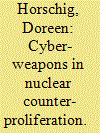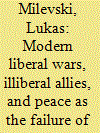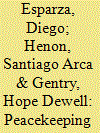|
|
|
Sort Order |
|
|
|
Items / Page
|
|
|
|
|
|
|
| Srl | Item |
| 1 |
ID:
173168


|
|
|
|
|
| Summary/Abstract |
Under what conditions are cyber-weapons effective in nuclear counter-proliferation? With continued interest in nuclear proliferation professed by Iran, North Korea, and Saudi Arabia, a discussion of the effectiveness of counter-proliferation measures remains relevant. Cyber-attacks as military option in a state-on-state conflict still requires additional corroborating evidence to make conclusions about its long-term effectiveness. This work analyses the general applicability of cyber-weapons and their usefulness in nuclear counter-proliferation. Through a comparative case study of Operation Orchard, Stuxnet, and recent “Left-of-Launch” operations against North Korea, the essay finds that cyber-operations are not particularly effective against nuclear programmes that are in the later stages of their development. They can disrupt and delay a nuclear programme temporarily, if the attack remains clandestine, but cannot halt nuclear proliferation all together. However, effectiveness increases if they are used in combination with conventional weapons. The article addresses a topic of interest to national-level decision-makers: whether cyber-operations can and should play a role in nuclear counter-proliferation.
|
|
|
|
|
|
|
|
|
|
|
|
|
|
|
|
| 2 |
ID:
173165


|
|
|
|
|
| Summary/Abstract |
The post-Cold War period nearly up to the present has been characterised as the age of liberal wars, yet key facets of the liberal guidance of war remain under appreciated. This article seeks to address this wider gap with regard to the particular concern of war termination and the fulfilment or failure of policy. First, it develops characterisations of liberal wars based on the existing literature, identifying three broad types through consideration of context—defensive versus offensive—and of political and strategic agency, particularly regarding the motives for and intents of action. Three types of liberal wars result: defensive liberal wars, offensive liberal wars with humanitarian motive and geopolitical intent, and offensive liberal wars with geopolitical motive and humanitarian intent. The article then presents one exemplary case for each liberal war with an emphasis on how liberal strategy required an illiberal ally and that ally's effect on the subsequent peace.
|
|
|
|
|
|
|
|
|
|
|
|
|
|
|
|
| 3 |
ID:
173166


|
|
|
|
|
| Summary/Abstract |
There have been over 90,000 UN peacekeepers deployed around the world to 78 peacekeeping operations (PKOs) in over 125 countries since 1948. Some scholars have made the case that these missions have had a positive impact on the relationship between the military and the civilians they work for. However, other scholars have identified a negative impact on civil military relations (CMR). This paper contributes to this debate by investigating how peacekeeping has impacted civil-military relations in Latin America's most prolific contributor to peacekeeping: Uruguay. This paper finds that PKOs in Uruguay have facilitated post-transitions attempts by civilians to build first-generation control, but not second-generation control. Further, PKOs have marginally improved military effectiveness, but we find that they do not improve societal trust in the armed forces.
|
|
|
|
|
|
|
|
|
|
|
|
|
|
|
|
| 4 |
ID:
173164


|
|
|
|
|
| Summary/Abstract |
The separation of the Indonesian national police (POLRI) from the military (ABRI), now named the TNI, in 1999 led to transfer of domestic security role from the armed forces to POLRI. On one hand, POLRI has a greater role in internal security, particularly in countering terrorism. On the other hand, TNI continually attempts to reassert its dominance in the field of counter-terrorism. Previous studies on the subject place the issue in the context of the early days of democratisation. This paper aims to contribute by counting latest developments, notably the rise of new terrorist groups and recent counter-terrorism legislations. We argue that institutional rivalries between the POLRI and the TNI, and the military's determination to reclaim a greater role in domestic security have become an impediment to achieving successful counterterrorism efforts. This article also examines the development of military reform against the backdrop of the military's disproportionate and growing influence.
|
|
|
|
|
|
|
|
|
|
|
|
|
|
|
|
| 5 |
ID:
173167


|
|
|
|
|
| Summary/Abstract |
The recent rise in the defence budgets among the NATO members reawakens the free-riding dilemma. This article provides an analysis of the defence spending of two new member states, the Czech Republic and Lithuania. Based on the free-riding theory, we explain why some of the new NATO members decide to increase their defence budgets (Lithuania), and others do not (Czech Republic). In contrast to the majority of works which focus either on the US as the biggest spender or on the “old” members of the Alliance, we explain under what circumstances some of the small European states who became new NATO members started to increase their defence budgets even though they do not have to, and the literature suggests that free-riding is easier. In the process, we identify three crucial factors that influence the decision-making process in this regard: the level of threat perception, economic situation, and the US pressure.
|
|
|
|
|
|
|
|
|
|
|
|
|
|
|
|
| 6 |
ID:
173163


|
|
|
|
|
| Summary/Abstract |
This essay argues that a Sino-Russian alliance has come into being over many years of the two states’ evolutionary policies. Although Vladimir Putin has emphasised that this is a multi-faceted relationship, this essay focuses exclusively on its military dimension. It comprises extensive inter-ministerial and inter-governmental cooperation, arms sales, joint exercises, and shared political orientation. While it may not be a formal alliance like NATO research, e.g. by Alexander Korolev, indicates that in general experts argue that what they have achieved is even better than an alliance.
|
|
|
|
|
|
|
|
|
|
|
|
|
|
|
|
|
|
|
|
|